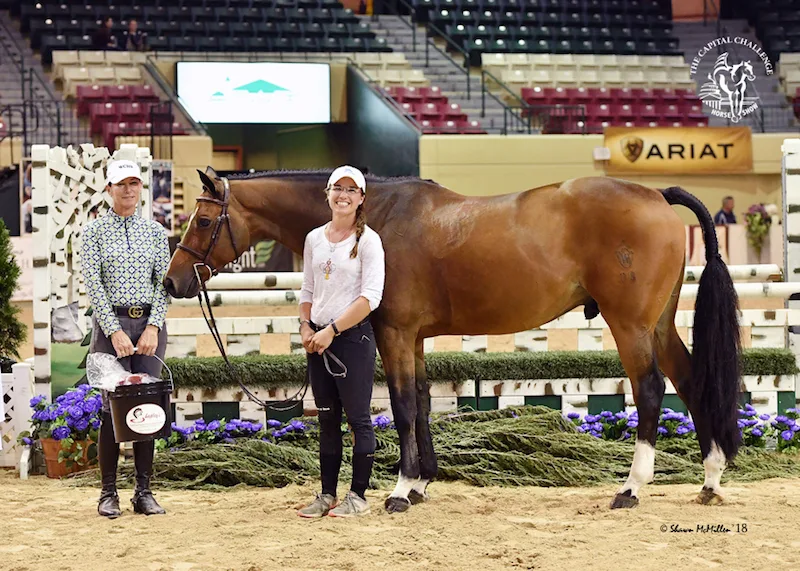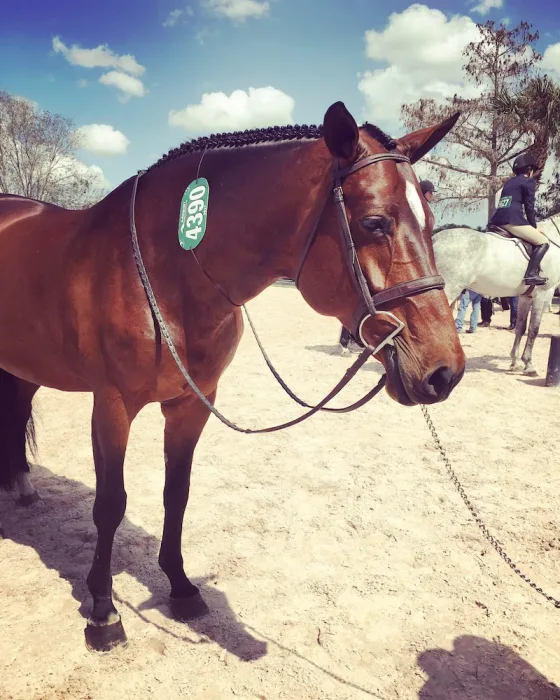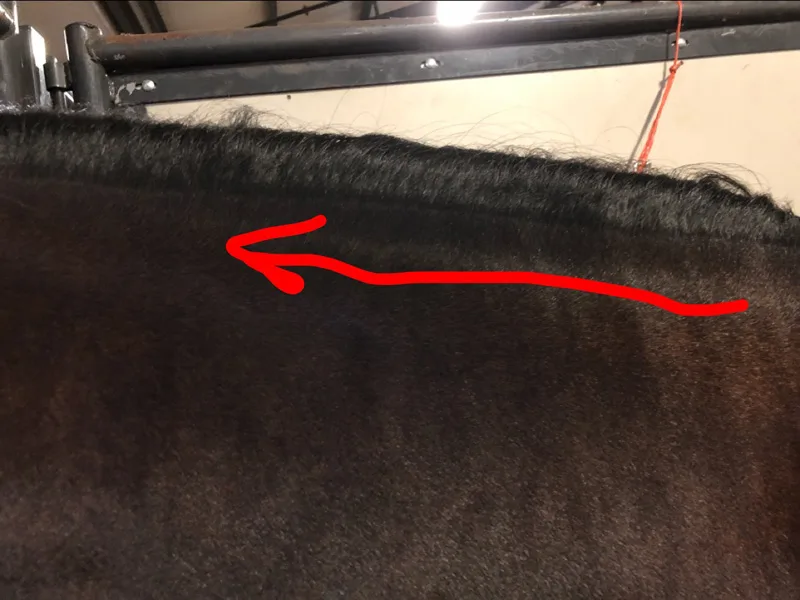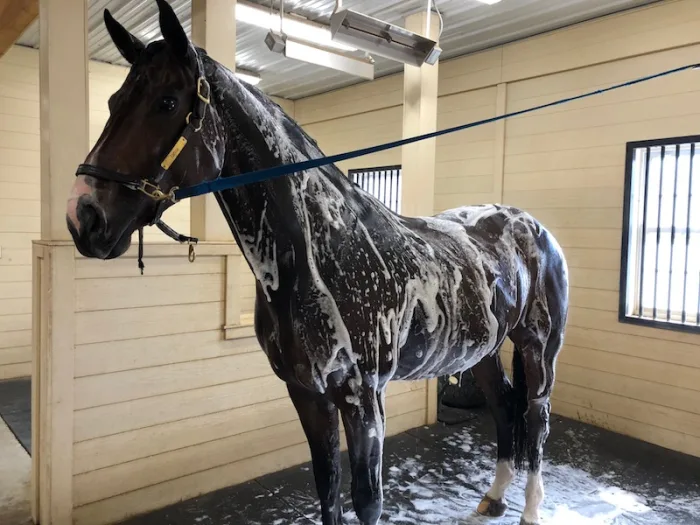In January, I turned 28, which means I have reached the age where I am beginning to ponder my future. I’ve begun to reflect on my past, and I constantly ask myself where I’m going and what my next plan is.
Last fall I taught a show grooming class at my alma mater, Centenary University (New Jersey). I did it after my regular job for Amanda Steege, every Tuesday night from September through the middle of December. I was recreating and reviving the grooming course, which made me reflect back on all of my years of experience and derive what I felt was important to teach the students.

My wealth of grooming experience helped me win the Best Turnout award at the 2018 Capital Challenge (Md.) for Balou in the 3’3” amateur-owner hunter, 18-35, division. Shawn McMillen Photo
I found that I enjoyed teaching a lot. Both my students and I were nervous on the first day; none of us sure what to expect. I was hoping to have kids who were passionate about horses and wanted to learn; they, I’m sure, just wanted a professor who wouldn’t bore them to death with the material. In order to prepare for this class, I asked a lot of my fellow graduates and younger students what they thought they should have learned in school that they had not. I pooled my other ideas together with theirs and came up with material for almost 20 weeks, several weeks over the number I needed.
Within that poll, my friends said they wished that their employers had more time to teach them, or even had the desire to teach them how to properly do their jobs. I agree with that; I find that’s a detriment in our industry as well. Employers are sometimes either too busy or do not want to instruct their employee on how to care for horses.

Teaching the students to curry, curry, curry, is super imperative!! This is one of Val Renihan’s horses, Amalita, waiting to jog in Wellington (Fla.). Nicole Mandracchia Photo
I treated the kids like I would want to be treated by a mentor, like how Robin Rost Brown treated me for so many years. The first day of class I had each student groom and present their care horses in 45 minutes to me in a lineup. My reasoning behind this? I wanted to see the levels they were all at. I did not want to assume that any of them had ever had a serious grooming job. Several of them had, but I had a class of 14 students.
After a slow start on Day 1, I knew where I stood; we had some work to do. I instructed, showed them how and why I do things, and did not yell. When they made mistakes, I corrected them and gave them a way of rethinking the situation so they wouldn’t make the same mistake twice. When they succeeded, I got excited. If they answered a tough critical question, I applauded. If they couldn’t reason an answer out, we discussed it as a class until they came up with the correct answer. We did many demonstrations in the barn, watched videos, and I even brought a few of my friends in to help with specific topics, like trailering and safely shipping horses.
ADVERTISEMENT
I tried to make the class fun and interesting. It required a lot of breaking down my normal day-to-day activities into simple pieces, something I found rather difficult. I just automatically do the tasks I do because I’ve done them every day for so long. Each night, I would make myself sit down and work on breaking things into simple parts.
Along with my PowerPoints, I told the students a lot of funny stories, about mistakes that I had made, and moments where I felt like quitting. I’ve hit the dirt hundreds of times; I got right back on. I’ve gone off course. I’ve ridden stoppers. I’ve ridden nice horses. I’ve ridden untrained horses. I’ve cried before, during and after work; gotten angry, not eaten all day and worked until every muscle in my body is sore. If you’re in this industry, you’ve had all of those moments. And I think it’s important to tell up-and-coming students and professionals that. They need to understand all aspects, and they also need to understand that there are as many (if not more) downs as there are ups.

I taught the students how to do a proper setup at a horse show. This one in particular is from the Garden State Horse Show (N.J.) in 2016. I’m really proud of this one!! Nicole Mandracchia Photo
My final exam consisted of a lineup of all the care horses, tacked up and groomed. The students had to answer several questions for me, based on the material we covered all semester. Don’t think they got off that easy—they also had a written final! I’m hoping to teach the course again this fall, and I’ve created new information from our successful HITS Ocala (Florida) winter circuit, which just recently ended.
I wanted my students to take several things away from this class. I told them I hoped that my wealth of knowledge would allow them to take better care of a horse one day, whether they became a groom, professional, amateur or none of the above. I hoped they would take some piece of my knowledge and use it in the future. In addition, I wanted them to learn about how important networking is and how to go about creating a network. And finally, I wanted them to understand that grooming is NOT just about knowing how to brush a horse well; it encompasses so many other parts that go toward the overall care of each horse.
Let’s be honest, no one does horses to make millions of dollars. I think it’s important to remember that there are a lot of steps required before becoming a well-respected pro, and I don’t think that is stressed enough nowadays. I’m a firm believer in doing things the correct way, and I believe that if you want to be a professional, you need to put your time in. Just because you survived one winter circuit in Florida working for someone does not automatically mean you can come back and do it by yourself. Just because you worked for a top jumper trainer for one year does not mean that you’re going to be able to go out and win the grand prix.
I’ll give you an example, as I did to my students. When I graduated from college, I was told to go open my own business by several local pros. They told me I could do it. But I refused. I didn’t feel like I had learned enough; I wanted to learn more. I wanted to experience as much as I could before I did that. Then, I felt my experience would speak more volumes.
ADVERTISEMENT
Trust me, it’s scary thinking about going out on your own. There are a lot of good professionals out there who have made a name for themselves. There is a lot of competition. There are a lot of nice horses and nice barns. There are a lot of good teachers, coaches and trainers. There is a lot of judgment, subjectivity. Opinions. There is A LOT of money that I don’t even come close to having. Coming from someone who has no family involved in horses at all, there’s no one who understands all of this better than I do. I would, essentially, be literally on my own with no one to support me.
Don’t get me wrong, my parents have supported every step of my riding career to the best of their ability. They helped pay for it until I was 18, and then I was on my own. My mom came to watch me show when she could, and when I was organized enough to tell her when I was showing. But I never had parents who stood at the side of the ring and told me how to ride my horses and the courses. They never found me the best horses or paved the way for me with other professionals. I did not have an illustrious junior career. I almost made it to indoor finals as a junior, but then made several mistakes at regionals. My mom told me to go learn as much as I could when I started, and that’s what I did. I made my own way. I had to CREATE all of that.
I always want to learn more, and in a way, that seems to be my strength and my weakness. I always want to correct what I’m doing wrong, but I oftentimes tell myself I don’t have enough experience to do something. And that pushes me to do more, to work harder, to go find more experience.
Some days I can see myself doing this, having my own business and teaching kids and adults how to ride (which I absolutely love to do). And other days when I make little mistakes, I tell myself I can’t do it yet. So I go find more horses to ride and work with. I try to make that horse straighter with my leg or ask for the lead change better.
A lot has happened to me over the years, both positive and negative. But you better believe that no matter what happened, I never gave up and always kept my eyes focused on my end goal: learning as much as I could about caring for and riding horses.
Nicole Mandracchia grew up riding in New Jersey and was a working student while in school. She graduated from Centenary University (N.J.) and has groomed and barn managed for top show barns Top Brass Farm (New Jersey), North Run (Vermont), Findlay’s Ridge (New York) and Ashmeadow (New Jersey). Read more about her in “Groom Spotlight: Nicole Mandricchia Proves The Harder You Work, The Luckier You Get.” After more than a decade working back in the barn, she eventually hopes to establish herself as a trainer. Read all of Nicole’s COTH blogs.


















